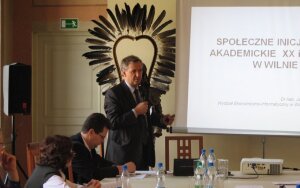- October 2, 2012
- 274
Wołkonowski: Social Academic Initiatives in Vilnius

“Undertaking an academic initiative by a social group requires a great amount of effort. Such people should have a scientific potential, financial resources, organizational and abilities.”, said Professor Jarosław Wołkonowski, while speaking at the “Lithuanian Poles or Poles inLithuania”- conference. According to Wołkonowski the greatest number of initiatives of that kind were launched by Poles.
He also said that the government inVilniuswas always against such initiatives treating them apprehensiveness, as occasions to strengthen national groups.
Academic initiatives are activities undertaken by a social group in order to establish scientific institutions in order to conduct scientific research and study. Professor Wołkonowski enumarated eight social academic initiatives in the 20th and 21st century.
The Society of Friends of Science, established in Vilnius on January 17th, 1907 by Alfons Parczewski and Eliza Orzeszkowa, thanks to the change of policy of the tsarist government. It was to examine the country in natural, ethnographic, historical, economical and statistical terms. It had several hundred members and supporters. At the beginning the society was publishing a yearbook, and from1923 ajournal titled Ateneum Wileńskie (lit. The Vilnius Athenaeum). It supported the revival of Stephen Báthory University in 1919. The memento of the Society, apart from their research, is their headquarters built near the Green Bridge in Vilnius.
The Jewish Scientific Institute, established in March 1925 by Dr Max Weinreich and Dr Tsemakh Shabad, in order to do research in Jewish language and literature, training researchers and monitoring events of Jewish cultural life worldwide. The honorary presidium included, among others, Albert Einstein and Siegmund Freud. One of the greatest works of the institute was the elaboration of Yiddish language grammar rules. The headquarters was their own building in18 Vivulskio St., destroyed during World War II.
Stephen Báthory Secret University, begun in February 1942 by professors of the Stephen Báthory University closed down by the Germans, continued until December 1944. They educated several hundred students. After WWII, most researchers moved to Poland in order to help establishing the Medical Academy in Gdansk and the Nicolaus Copernicus University in Toruń. The founder and chancellor of the university Prof S Ehrenkreutz was arrested by the Soviet government and died in prison in Lukiškės.
The Underground Seminary, created due to lack of priests in the end of the sixties. The Jesuits and the Marians Orders took part in the activities in order to help the seminarians to study. It was based on an independent and individual mode of studying. The curriculum included 36 subjects, which some students could manage to learn in 3 years, some needed even 8 or 10 years. Officially it had no chancellor or headquarters. According to Lithuanian sources, until 1990, 27 alumni were ordained.
ThePolishUniversityinVilnius, established after the first “Science and Living Quality” conference in September 1990. It was to include pedagogical, legal and medical studies and serve as a methodological and scientific research center. The plan was to make it a state university, but as time went by, the government ofLithuaniaopenly rejected such a possibility and the university worked as a part of the Scientific Society of the Poles of Lithuania. Although the Lithuanian Cabinet of Ministers granted 10.000 roubles to examine the possibility of establishing a Polish institution of higher education, the government did not undertake any steps in order to regulate the status of the initiative. The studies were conducted inVilniusaccording to agreements reached with universities inPoland. In 1998 it was registered as Universitas Studiorum Polona Vilnensis, but the Lithuanian authorities did not issue a permit to conduct the studies and rejected to recognise their diplomas. The university educated a few hundred students.
When thePolishUniversityofVilniuswas being established, launching a Russian university was initiated by Vitalius Bisakirskis. The institution was based on the Moscow State University of Technology and studies were conducted according to their curricula in law and economy. An attempt of legalization was not successful, as the Lithuanian authorities did not recognize neither their academic activities nor the diplomas. A few hundred students completed their study there.
TheEuropeanUniversityof the Humanities, established inMinskin 1992 by a group lead by scientist A. Mikhaylov, closed down in 2004 by the Belarusian government. It resumed its activities in2005 inVilniuswith help from the international community. In 2006 the Lithuanian authorities granted it a university status. The university conducts several types of study, on Bachelor, Masters and PhD level. In 2012/13 academic year the University has 583 students, including 113 doing a Master study and 3 on their way to a PhD. About 30 students take part in the Erasmus exchange, as it is the only Belarusian university to do so. The university has received strong financial support fromNorway, 2 million euro for three years of activity.
Because the Polish people had two-times lower percentage of educated people than the national average, the Lithanian government agreed to establish a branch of theBialystokUniversityinVilnius. At the moment, 442 students study either economy or IT, taught according to the curricula of theUniversityofBialystok. The Lithuanian authorities recognized its activity and share in the costs by providing state and social scholarships, as well as student loans. Up to now 233 students graduated, and their diplomas are recognized by means of validation of foreign diplomas and degrees.
Professor Wołkonowski concluded his lecture by saying that scientific research require great financial resources and leaders of the initiatives tried or are trying to sort it out their own way and that the Poles in Lithuania has been able to create the greatest number of such initiatives and in most cases succeeded in research and educational terms.
Tłumaczenie Sławek Stępski w ramach praktyk w Europejskiej Fundacji Praw Człowieka, www.efhr.eu. Translated by Sławek Stępski the framework of a traineeship programme of the European Foundation of Human Rights, www.efhr.eu.

